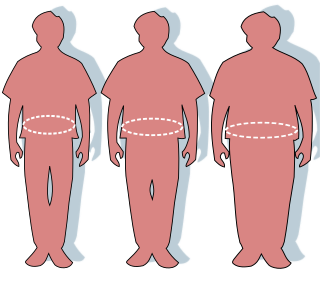Dieting is the practice of eating food in a regulated way to decrease, maintain, or increase body weight, or to prevent and treat diseases such as diabetes and obesity. As weight loss depends on calorie intake, different kinds of calorie-reduced diets, such as those emphasising particular macronutrients, have been shown to be no more effective than one another. As weight regain is common, diet success is best predicted by long-term adherence. Regardless, the outcome of a diet can vary widely depending on the individual.

The fat acceptance movement is a social movement which seeks to eliminate the social stigma of obesity. Areas of contention include the aesthetic, legal, and medical approaches to fat people.

Obesity is a medical condition, sometimes considered a disease, in which excess body fat has accumulated to such an extent that it can potentially have negative effects on health. People are classified as obese when their body mass index (BMI)—a person's weight divided by the square of the person's height—is over 30 kg/m2; the range 25–30 kg/m2 is defined as overweight. Some East Asian countries use lower values to calculate obesity. Obesity is a major cause of disability and is correlated with various diseases and conditions, particularly cardiovascular diseases, type 2 diabetes, obstructive sleep apnea, certain types of cancer, and osteoarthritis.

Eating is the ingestion of food. In biology, this is typically done to provide a heterotrophic organism with energy and nutrients and to allow for growth. Animals and other heterotrophs must eat in order to survive — carnivores eat other animals, herbivores eat plants, omnivores consume a mixture of both plant and animal matter, and detritivores eat detritus. Fungi digest organic matter outside their bodies as opposed to animals that digest their food inside their bodies.

Weight loss, in the context of medicine, health, or physical fitness, refers to a reduction of the total body mass, by a mean loss of fluid, body fat, or lean mass. Weight loss can either occur unintentionally because of malnourishment or an underlying disease, or from a conscious effort to improve an actual or perceived overweight or obese state. "Unexplained" weight loss that is not caused by reduction in calorific intake or increase in exercise is called cachexia and may be a symptom of a serious medical condition.

Body image is a person's thoughts, feelings and perception of the aesthetics or sexual attractiveness of their own body. The concept of body image is used in several disciplines, including neuroscience, psychology, medicine, psychiatry, psychoanalysis, philosophy, cultural and feminist studies; the media also often uses the term. Across these disciplines, there is no single consensus definition, but broadly speaking, body image consists of the ways people view themselves; their memories, experiences, assumptions, and comparisons about their appearances; and their overall attitudes towards their respective heights, shapes, and weights—all of which are shaped by prevalent social and cultural ideals.

In nutrition, diet is the sum of food consumed by a person or other organism. The word diet often implies the use of specific intake of nutrition for health or weight-management reasons. Although humans are omnivores, each culture and each person holds some food preferences or some food taboos. This may be due to personal tastes or ethical reasons. Individual dietary choices may be more or less healthy.

A healthy diet is a diet that maintains or improves overall health. A healthy diet provides the body with essential nutrition: fluid, macronutrients such as protein, micronutrients such as vitamins, and adequate fibre and food energy.

Childhood obesity is a condition where excess body fat negatively affects a child's health or well-being. As methods to determine body fat directly are difficult, the diagnosis of obesity is often based on BMI. Due to the rising prevalence of obesity in children and its many adverse health effects it is being recognized as a serious public health concern. The term overweight rather than obese is often used when discussing childhood obesity, as it is less stigmatizing, although the term overweight can also refer to a different BMI category. The prevalence of childhood obesity is known to differ by sex and gender.
Health at Every Size (HAES) is a public health framework that emphasizes all bodies have the right to seek out health, regardless of size, without bias, and reduce stigma towards people who are in larger bodies. Proponents argue that traditional interventions focused on weight loss, such as dieting, do not reliably produce positive health outcomes, and that health is a result of lifestyle behaviors that can be performed independently of body weight. However, many criticize the approach and argue that weight loss should sometimes be an explicit goal of healthcare interventions, because of the negative health outcomes associated with obesity.

Fat feminism, often associated with "body-positivity", is a social movement that incorporates feminist themes of equality, social justice, and cultural analysis based on the weight of a woman. This branch of feminism intersects misogyny and sexism with anti-fat bias. Fat feminists advocate body-positive acceptance for all bodies, regardless of their weight, as well as eliminating biases experienced directly or indirectly by fat people. Fat feminists originated during third-wave feminism and is aligned with the fat acceptance movement. A significant portion of body positivity in the third-wave focused on embracing and reclaiming femininity, such as wearing makeup and high heels, even though the second-wave fought against these things. Contemporary western fat feminism works to dismantle oppressive power structures which disproportionately affect working class poor people or poor people generally. It covers a wide range of topics such as diet culture, fat-phobia, representation in media, ableism, and employment discrimination.

Being overweight is having more body fat than is optimally healthy. Being overweight is especially common where food supplies are plentiful and lifestyles are sedentary.
Intermittent fasting is any of various meal timing schedules that cycle between voluntary fasting and non-fasting over a given period. Methods of intermittent fasting include alternate-day fasting, periodic fasting, such as the 5:2 diet, and daily time-restricted eating.

Weight management refers to behaviors, techniques, and physiological processes that contribute to a person's ability to attain and maintain a healthy weight. Most weight management techniques encompass long-term lifestyle strategies that promote healthy eating and daily physical activity. Moreover, weight management involves developing meaningful ways to track weight over time and to identify the ideal body weights for different individuals.

Prenatal nutrition addresses nutrient recommendations before and during pregnancy. Nutrition and weight management before and during pregnancy has a profound effect on the development of infants. This is a rather critical time for healthy development since infants rely heavily on maternal stores and nutrient for optimal growth and health outcome later in life.
Social stigma of obesity is broadly defined as bias or discriminatory behaviors targeted at overweight and obese individuals because of their weight and a high body fat percentage. Such social stigmas can span one's entire life, as long as excess weight is present, starting from a young age and lasting into adulthood. Studies also indicate overweight and obese individuals experience higher levels of stigma compared to other people.
Nutrition psychology (NP) is the psychological study of the relationship between dietary intake and different aspects of psychological health. It is an applied field that uses an interdisciplinary approach to examine the influence of diet on mental health. Nutrition psychology seeks to understand the relationship between nutritional behavior and mental health/well-being NP is a sub-field of psychology and more specifically of health psychology. It may be applied to numerous different fields including: psychology, dietetics, nutrition, and marketing. NP is a fairly new field with a brief history that has already started to contribute information and knowledge to psychology. There are two main areas of controversy within nutrition psychology. The first area of controversy is that the topic can be viewed in two different ways. It can be viewed as nutrition affecting psychological functions, or psychological choices and behavior influencing nutrition and health. The second controversy is the defining of what is "healthy" or "normal" as related to nutrition.

Obesity and the environment aims to look at the different environmental factors that researchers worldwide have determined cause and perpetuate obesity. Obesity is a condition in which a person's weight is higher than what is considered healthy for their height, and is the leading cause of preventable death worldwide. Obesity can result from several factors such as poor nutritional choices, overeating, genetics, culture, and metabolism. Many diseases and health complications are associated with obesity. Worldwide, the rates of obesity have nearly tripled since 1975, leading health professionals to label the condition as a modern epidemic in most parts of the world. Current worldwide population estimates of obese adults are near 13%; overweight adults total approximately 39%.

Body positivity is a social movement that promotes a positive view of all bodies, regardless of size, shape, skin tone, gender, and physical abilities. Proponents focus on the appreciation of the functionality and health of the human body, instead of its physiological appearance.
Dianne Neumark-Sztainer is a University of Minnesota Regents Professor in the Division of Epidemiology and Community Health at the School of Public Health. She is a scholar on adolescent and young adult eating and weight-related health.












